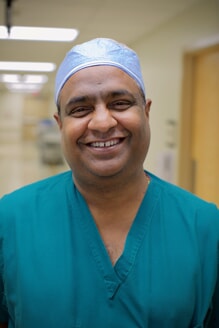The unexplained symptoms that could provide clues of a thyroid condition
Dec 1, 2020

Differentiating normal aches and pains from serious, underlying conditions is no simple feat. We may attribute slight weight gain or weight loss to fluctuations in our diet, or a fluttering heartbeat to the stresses of a busy work week. However, thoracic surgeon Satish “Kesava” Kesavaramanujam, MD, says these are precisely the symptoms of thyroid conditions that often go undiagnosed.
“Unexplained weight gain or loss, increased palpitations of the heart, a lump in the neck that moves when swallowing – these are the most catch-worthy symptoms of a thyroid disorder,” says Kesava.
The thyroid, a small butterfly-shaped gland found in the lower neck, produces the hormones that regulate metabolism, manage body temperature, control heart rate and influence other core physical functions.
Serious health conditions may develop if the thyroid begins to overproduce or underproduce hormones. If left untreated, thyroid conditions may lead to autoimmune disorders, as well as an increased risk of osteoporosis, cardiovascular disease and infertility.
“Thyroid disorders are a fairly common occurrence that we diagnose in patients weekly,” says Kesava. “They are a reasonably safe entity to treat and we are well-equipped to manage conditions of varying severity.”
Patients who experience symptoms of a thyroid disorder may consult their primary care provider, who can refer them to a specialist. After the appropriate tests and blood work are completed, and a thyroid disorder is confirmed, treatment options will be discussed to help get patients on a path toward recovery.
Depending on the type of disorder, patients may be recommended for medical or surgical management of their condition. Medical management involves taking medication until the thyroid returns to safe hormone production levels. When medication is not an option, or if there is evidence of cancer, patients will be recommended for surgery to remove all or part of the thyroid.
“The procedure is relatively safe, although patients will be required to take medication the rest of their life if the whole thyroid gland is removed,” says Kesava. “Aside from this, they can continue living as they normally would with very little change in their lifestyle.”
While not preventable, thyroid disorders are treatable and can be successfully managed. With these and all other medical conditions, Kesava encourages individuals to establish healthy habits early in life, to help prevent complications or help offset their effects.
“A good diet, good amount of sleep and reasonable exercise lead to healthy living, and more importantly, healthy aging,” he says. “Healthy status indefinitely leads to less complications later in life.


